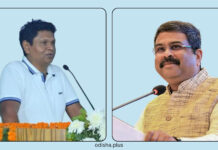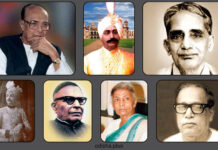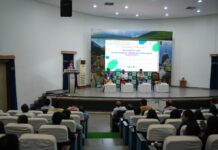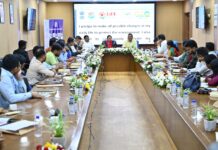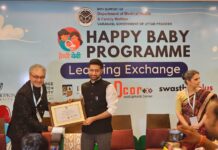Dr. Mrinal Chatterjee
“Mohe rang de basanti chola..”. You must have heard this song used in many films, mostly on films made on the life of Saheed Bhagat Singh. This song was written by Ram Prasad Bismil, who like Bhagat Singh was hanged to death by the alien rulers.
Ram Prasad Bismil was a poet, writer and revolutionary. Born in Uttar Pradesh’s Shahjahanpur district to Murlidhar and Moolmati on June 11, 1897 Ram Prasad was associated with the Arya Samaj from an early age.
The ideals of a revolution first took root in his mind when he read about the death sentence awarded to Bhai Parmanand, an Indian nationalist and Arya Samaj missionary.
Ram Prasad Bismil started writing poetry early. In fact, he was just 18 then and vented his anguish through his poem ‘Mera Janm. He used several pen names like ‘Ram’, Agyat’ and ‘Bismil’ to write in Hindi and Urdu. However, the pen name ‘Bismil’ (which means a sacrificed or slaughtered animal in Urdu) somehow stuck and he was mostly known as Ram Prasad ‘Bismil’.
He got in touch with Genda Lal Dixit, a school teacher. Both shared revolutionary ideas and wanted to organise the youth of the country to fight the British government.
Bismil was involved in the Mainpuri Conspiracy of 1918 in which police found a few young people including Bismil selling books that were not prescribed by the government. He published a pamphlet titled ‘Deshwasiyoke Naam’ and distributed it along with his poem ‘Mainpuriki Pratigya’.
Disillusioned with the idea of non-violence and opting revolutionary movements as a way to achieve freedom, Bismil attempted to form an association of like minded youth. Bismil was one of the chief founders of the Hindustan Republican Association (HRA) along with Sachindra Nath Sanyal and Jogesh Chandra Chatterjee (who was also a member of the Anushilan Samiti) in 1923 at Allahabad with the blessing of Lala Har Dayal. It was believed that its constitution was drafted chiefly by Bismil. This organization was later named as Hindustan Socialist Republican Association (HSRA). In 1924 – 25, many young people joined the party, prominent among them being Bhagat Singh, Sukhdev and Chandrasekhar Azad.
In 1925, Bismil and his companions Chandrasekhar Azad and Ashfaqulla Khan decided to loot a train in Kakori near Lucknow. They were successful in their attempt but were arrested alongside a dozen other HRA members within a month of the attack and tried under the Kakori Conspiracy Case.
The legal process lasted 18 months. Bismil, Lahiri, Khan and Thakur Roshan Singh were awarded death sentences.
In Lucknow Central Jail, Bismil wrote his autobiography, considered as one of the finest works in Hindi literature and also the cult song “Mera rang de Basantichola”. His autobiography was smuggled out of the prison and was published in 1928 by Ganesh Shankar Vidyarthi (freedom fighter and editor of Hindi weekly Pratap).
On December 19, 1927 Ram Prasad Bismil, Ashfaq Ulla Khan and Roshan Singh were hanged in different jails; Bismil was hanged in Gorakhpur jail.
(Journalist turned media academician, the author is Prof Dr. Mrinal Chatterjee presently works as Regional Director of the Eastern India campus of Indian Institute of Mass Communication located at Dhenkanal., Odisha. Views are personal.)
Tags: #RamPrasadBismil #AryaSamaj #non-violence #HindustanRepublicanAssociation #MerarangdeBasantichola #IndiaFreedomFighter



